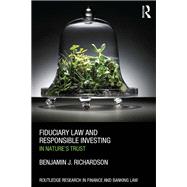- ISBN: 9780415691369 | 0415691362
- Cover: Hardcover
- Copyright: 4/23/2013
Socially responsible investment (SRI) and its regulation is a topic of significant international interest. The movement for SRI has expanded from its beginnings as a church-based movement, with single-issue interests, to encompass a much broader agenda including the environment and sustainable development. Nonetheless, the growth of SRI has met with some caution or resistance from mainstream financial institutions, which are concerned about its legality. Fiduciary law, the rules designed to ensure that trustees manage the assets of beneficiaries in their best interests, has generated much international discussion in the financial sector about whether it operates as an obstacle to or mandate for SRI focused on whether social and environmental issues can be deemed "financially material" to investors, and therefore recognised as legally permissible considerations. This book takes a broader look at the issues facing SRI and fiduciary duties. It evaluates how the fiduciary duties and some related legal rules governing financial institutions shape the prospects for socially responsible investment, and theorises how to reform this area of law to promote investment that supports environmentally sustainable development. The book considers how fiduciary duties manifest themselves differently in various investment institutions such as pension plans, mutual funds, insurance companies and charitable foundations. Importantly it also analyses fiduciary decision-making in practice. The book contains extensive empirical research, based on cases studies, interviews and questionnaires to explore questions such as: how do fiduciaries actually weigh financial and environmental considerations when making investment decisions? What weight do fiduciaries give to the views of beneficiaries? How do fiduciaries interpret their legal duties? The book elaborates a legal framework to promote environmentally responsible fiduciary finance, drawing upon the public trust doctrine to formulate a concept of "nature "s trust" as the principal tool for a fundamental paradigm shift in financial investment towards sustainability. This book spans a range of international experiences, makes detailed legal and market analysis of specific financial institutions, and offers practical directions for reform, and as such it will be of interest to scholars, policy-makers, intergovernmental organisations, and business and environmental organisations interested in ethical and environmental investment.






